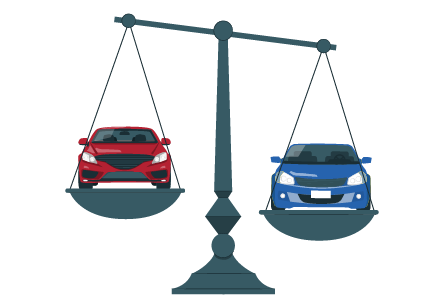How much exactly does a car weigh? It’s asked and wondered much more often than you think. Right off the bat, we can tell you that the EPA has recorded the average weight of a car as 4,156 pounds (1,885 kg). The vehicle weight rating of a car can have some effects on the overall driving and handling of the vehicle.
A larger vehicle like a truck will often require more specialized skills to drive than standard cars in terms of weight. But why should you at least consider your car’s weight? Explore our tell-all guide to vehicle weight.
The Basics About Car Weight
For starters, the weight of a car can impact how much you stop for gas, shop for car insurance, and so much more. Here are some general rules of thumb when it comes to car weight:
- Cars that weigh lighter are typically prone to more damage in collisions and accidents. A heavier vehicle would not get the brunt of the damage in an accident. Not only this, but the chances of death occurring are increased by 47% with every 1,000 pounds (454 kg) the opposing vehicle weighs. It always helps to have safety features like motion detectors and collision warning systems if you drive a lightweight car like a sedan.
- Cars that weigh heavier typically have higher fuel consumption than lighter-weight cars. Pickup trucks and SUVs, for example, have a demanding gas economy and fuel consumption compared to mid-sized and smaller cars. For some car shoppers, the gas cost is a large part of their budget. Electric vehicles have a more modest weight and are much more fuel-efficient.
- Maintenance tools required to fix your car may need your vehicle weight rating so that the mechanics can use the proper tools. Knowing the vehicle weight is especially important for tools like jacks if you get a flat tire.
- If you lean towards the larger car side for hauling purposes, then having an idea of the weight is imperative if you wish to know your car’s hauling capabilities and limits.
- Knowing your vehicle weight rating is always a good idea since your car’s information is recorded, and weight minus any cargo will likely be included in such records.
How Car Weight is Measured
Several different units of car weight are measured. The following are each of them:
- Curb weight - The weight is a collective of all the car parts (including a full fuel tank) without any passengers or a driver.
- Gross vehicle weight - Gross vehicle weight is just like curb weight, except add the weight of the passengers, driver, and any luggage or cargo.
- Gross combination weight - This car weight measurement is only applied to trucks or vehicles with trailers or other such attachments as it accounts for the combined weight of the vehicle and the item it’s hauling. Knowing the weight is significant because it also helps tell what trailer will be too heavy for the vehicle to haul.
- Gross combination weight rating - This is a maximum weight limit that any given vehicle must not exceed to prevent damage. Cars gross combination weight rating is legally enforced –as good a reason as any to at least have a general idea about it.
Average Car Weights by Vehicle Type
To give you a more general idea of how certain types of cars tend to weigh, here is a list of all the average vehicle weights for a wide array of body styles:
- Average smart car weight - 1,500 pounds (680 kg)
- Average subcompact car weight - 2,600 pounds (1,179 kg)
- Average compact car weight - 2,600 to 3,000 pounds (1,179 to 1,361 kg)
- Average midsize car weight - 3,300 pounds (1,497 kg)
- Average large car weight - 4,400 pounds (1,996 kg)
- Average subcompact SUV - 3,000 to 3,500 pounds (1,361 to 1,588 kg)
- Average midsize trucks/SUV - 3,500 to 6,000 pounds (1,588 to 2,722 kg)
- Average large SUV - 5,400 to 6,000 pounds (2,449 to 2,722 kg)
- Average weight of compact trucks- 5,000 to 5,500 pounds (2,268 to 2,495 kg)






